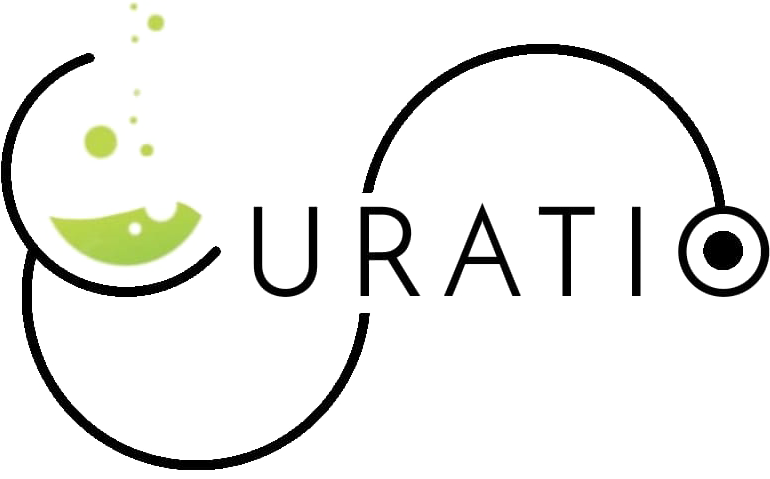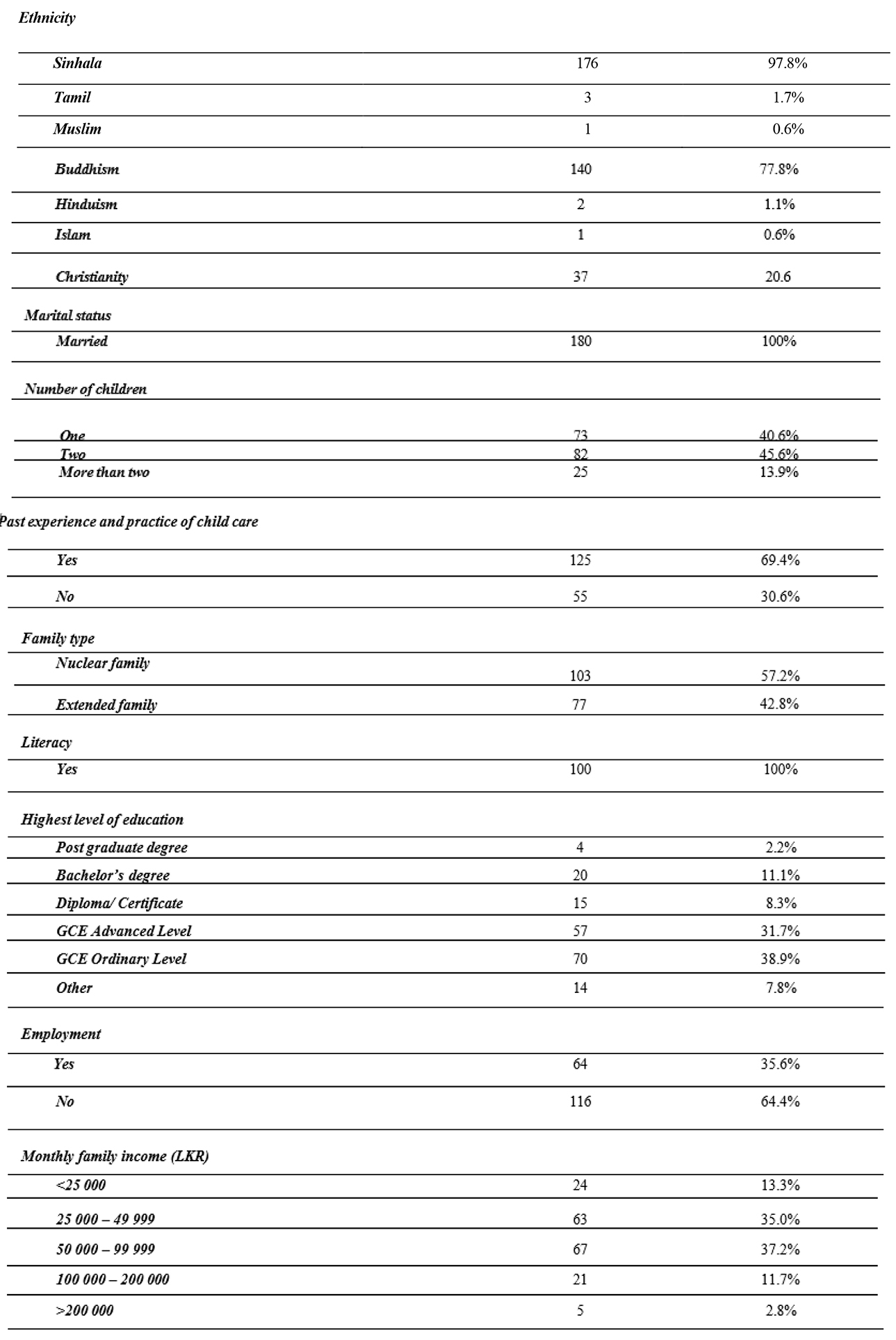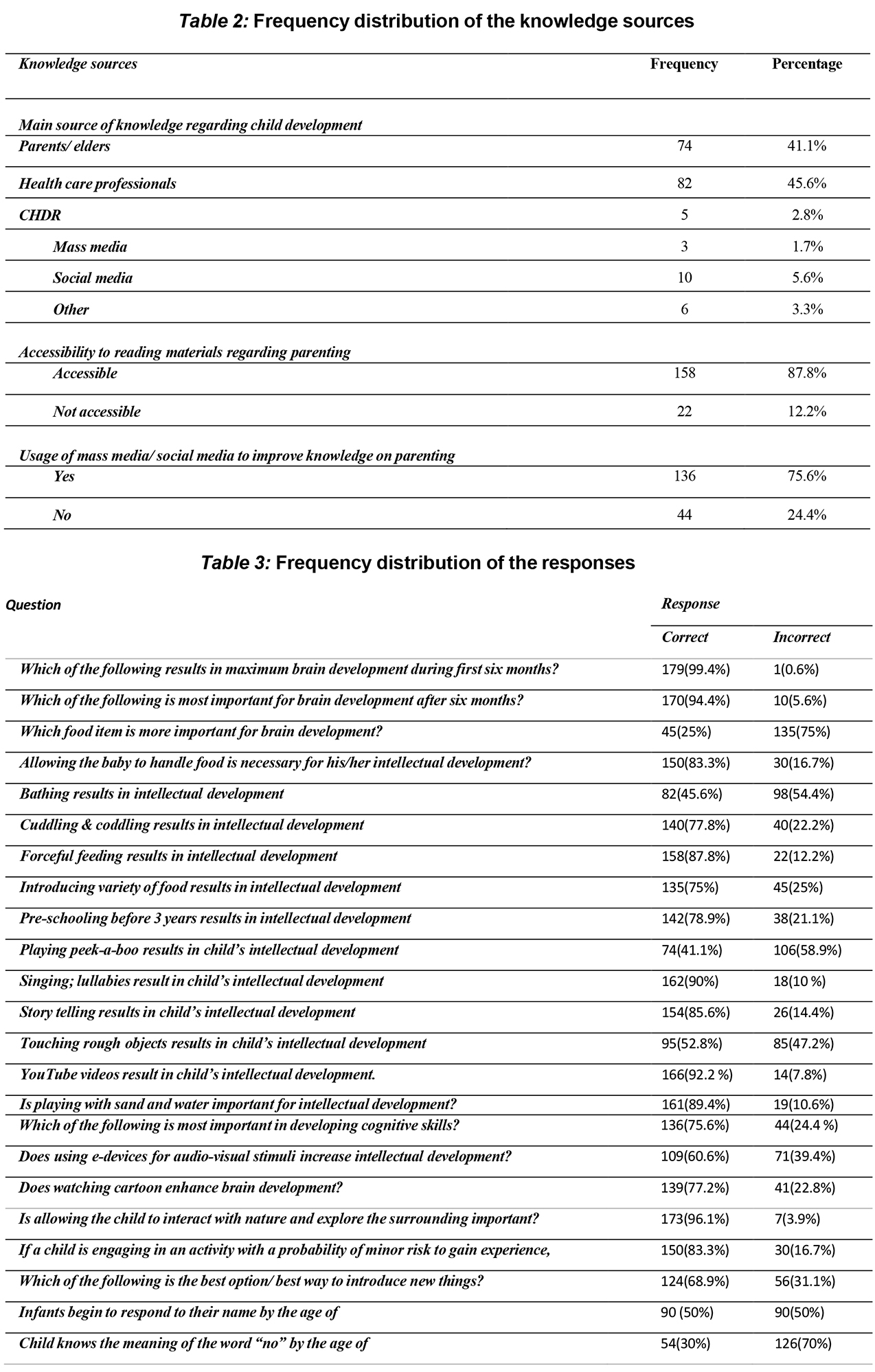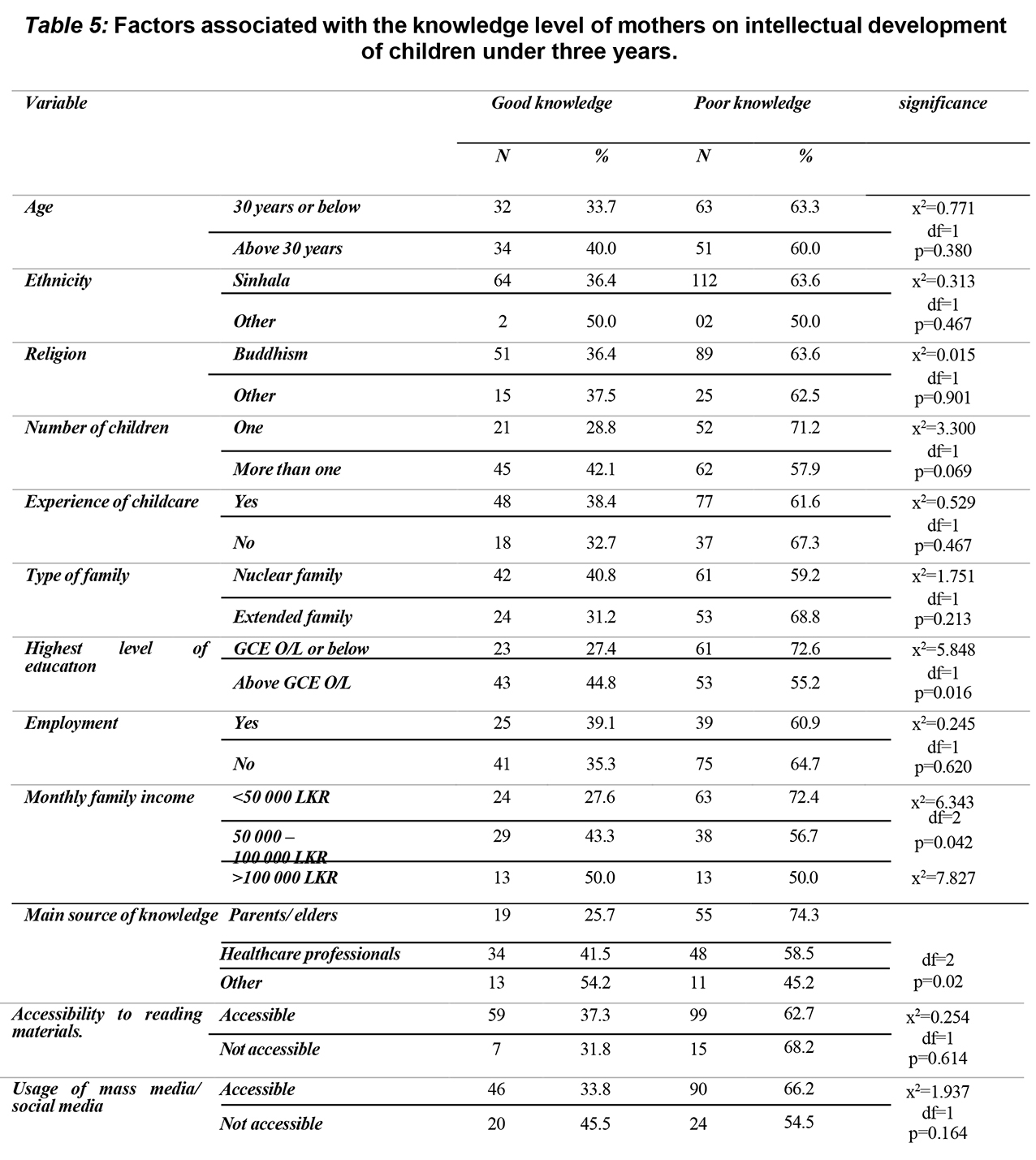
Medical Journal
Published by
Faculty of Medical Sciences,
University of Sri Jayewardenepura,
Nugegoda,
Sri Lanka.
Original Articles
Knowledge on intellectual development of children under three years and its associated factors, among mothers attending selected child welfare clinics in Western province
Mataraarachchi Y1*, Liyanage T S 1, Fernando S N1, Ganegoda K G1, Hewage D C2, Shiyam A3 , Seneviwickrama K L M D3
1Faculty of Medical Sciences, University of Sri Jayewardenepura, Sri Lanka
2Department of Physiology, Faculty of Medical Sciences, University of Sri Jayewardenepura, Sri Lanka
3Department of Community Medicine, Faculty of Medical Sciences, University of Sri Jayewardenepura, Sri Lanka
*me93658@sjp.ac.lk
Abstract
Background: The first three years of life is a crucial period for intellectual development. Thus, adequate maternal knowledge is necessary in the aspect of intellectual development of children.
Objectives: To describe the knowledge on intellectual development of children under three years among mothers attending selected child welfare clinics in Western province.
Methods: A descriptive cross-sectional study was conducted among mothers of children under 3 years, attending selected child welfare clinics in Western province. A sample of 180 mothers from six MOH divisions was chosen by two stage systematic sampling. Maternal knowledge was assessed through a 15-item validated pre-tested interviewer administered questionnaire with a minimum possible score of -13 and a maximum possible score of 20. Total score was converted to a percentage and dichotomized as ‘Good’ and ‘Poor’ using the cut-off of 61.25% which was the mean score of the pilot study. Data was analysed by using SPSS software version 25.
Results: Majority were between 20-30 years (51.1%, n=92) with 69.4% (n=125) past parenting experience. Main source of knowledge on child development is healthcare professionals (45.6%, n=82). Though 87.8% stated the accessibility of reading material on parenting, 63.3% (n=114) had poor knowledge on intellectual development. Majority were aware of the negative impact of forceful feeding (87.8%) and pre schooling <3 years (78.9%) on intellectual development. Higher family income and higher educational level of the mother were associated with higher knowledge on intellectual development.
Conclusions: Knowledge on intellectual development is inadequate among mothers attending selected child welfare clinics in Western province.
Key words: Knowledge, Intellectual development, Infants, Toddlers, Under three years.
Introduction
Intellect is the ability to think in a logical way and understand things, especially at an advanced level.
The first two years of life is a crucial period during which nutritional factors and interaction with child play an important role in cognitive development (1). Parents’ knowledge together with their commitment in practice has proved to have a positive impact on child’s intellectual development (2). A study conducted in Colombo district, Sri Lanka to assess the knowledge of mothers on development milestones and its determinant factors showed that 83.6% of mothers have a good knowledge about the cognitive domain of developmental milestones (3). However, no research on assessing the level of maternal knowledge on intellectual development in Sri Lankan context, Therefore, our study aims to describe the knowledge of mothers on intellectual development of children under three years of age and its associated factors.
Methodology
Descriptive cross-sectional study was conducted among mothers attending selected child welfare clinics from all three districts of Western province, from April 2022 to July 2022. Mothers attending child welfare clinics (CWC) conducted in Pitakotte, Awissawella, Kalutara, Bandaragama, Wattala and Negombo Medical Officer of Health (MOH) divisions were selected by two stage systematic random sampling method. Mothers of children under three months and mothers who could not communicate in English or Sinhala were excluded from the study. Sample size for the study was calculated using the prevalence from a study. Prevalence of good level of knowledge was taken as 83.6% based on another study conducted in Sri Lanka. The final sample size was 232 with a 10% non-response rate.
An interviewer administered questionnaire with two sections was used for data collection.
Section 1: Socio-demographic factors and knowledge sources
Section 2: Knowledge on intellectual development.
The questionnaire was prepared under the guidance of a consultant paediatrician and a consultant psychiatrist, using the ‘Knowledge of Infant Development Inventory’ questionnaire, Child Health Development Record and research articles as a guide.
The total number of 15 questions were used to assess the knowledge level of the participants. Thirteen questions had direct single best response as the correct answer. Remaining two questions were multiple choice questions with five responses. For single best response questions 1 mark was awarded for each correct response and 1 mark was deducted for each wrong response. No mark was given or deducted if the participant had responded no idea/ don’t know. For multiple choice questions if a correct answer was selected 1 mark was awarded. If an incorrect answer was chosen, no mark was awarded or deducted.
The pilot study was conducted among the mothers attending the CWC conducted outside the Western province to identify potential problems and revise the methods, to test the study instrument for comprehensiveness and clarity and to plan the time required for the process of data collection. The results were discussed among the group members and no alterations were required to be done in the questionnaire.
Ethical and administrative considerations
Ethical clearance for the study was obtained from the Ethical Review Committee of Faculty of Medical Sciences, University of Sri Jayewardenepura. Administrative clearance for data collection was obtained from the Provisional Director of Health Services, Western province and the respective MOHs.
Investigators explained the purpose of this research to the participants after distributing the information sheets and consent forms. Participation to the study was completely voluntary. Investigators conducted the questionnaire among the participants who gave their consent. The questionnaire was carried on with adequate privacy, to make sure their information is not disclosed to the third parties during the process of data collection. These data will never be used in such a way that the participants will be identified in any public presentation or publication.
Data was analysed using the IBM SPSS software version 25.0. Results were presented as percentages. Chi-squared test was used to test the associations. Level of significance was considered as p<0.05.
Results
A total of 180 respondents were recruited with a non-response rate of 7%. The sociodemographic characteristics of the study sample is given in Table 1. According to table 3, almost all the participants were knowledgeable about the importance of breastfeeding during first 6 months(n=179,99.4) and complementary feeding thereafter. (n=170,94.4%)
Majority of the participants (65.2%) have incorrectly stated that green leafy vegetables are the most important food item for brain development. Majority of mothers agreed that cuddling and coddling(n=140,77.8%), allowing the baby to handle food(n=150,83.3%), introducing a variety of food(n=135,75%), singing lullabies(n=162,90%), storytelling(n=154,85.6%) and touching rough objects(n=95,52.8%) is necessary for intellectual development. Majority were incorrect about the importance of bathing(n=98,54.4%) and playing peek-a- boo(n=10658.9%). Most of the mothers correctly disagreed that forceful feeding(n=158,87.8%), pre- schooling before 3 years(n=142,78.9%), watching YouTube videos(n=166,92.2%), using e-devices for audio-visual stimuli(n=109,60.6%), watching cartoon(n=139,77.2%) aids in intellectual development. Greater proportion of mothers were aware about the importance of playing with sand and water(n=161,89.4%), building blocks(n=136,75.6%) and interacting with nature(n=173,96.1%). Majority of the participants have stated that live experience is the best way to introduce new things to a child. (n=124,68.9%). 50% of mothers(n=90) were aware about the age that infants begin to respond to their name whereas only 30%(n=54) was aware about the age that child understands the meaning of ‘no’.




The maximum score of the questionnaire was calculated to be 20 marks. Marks obtained out of 20 were converted to a percentage and categorized into two categories as ‘Good knowledge’ and ‘Poor knowledge’ level of using the cut off value of 61.25% obtained by statistical analysis of data from the pilot study, using the mean percentage of knowledge. Accordingly, 36.7%(n=66) of mothers who participated in the study displayed a good level of knowledge on intellectual development of children under 3 years.
Table 5 demonstrates the factors associated with maternal knowledge on intellectual development. The proportion of mothers above 30 years with good knowledge level was higher (n=34,40.0%) than mothers aged 30 years or below. (n=32,33.7%) Mothers of other ethnicities (Tamil, Muslim) had good knowledge level than Sinhala mothers. 36.4% of Buddhist mothers had good knowledge on intellectual development, whereas 37.5% of mothers from other religions had good knowledge level. A greater proportion of mothers with more than one child had good knowledge level on intellectual development(n=45,42.1%) compared to others with one child. (n=21,28.8%). Among mothers with experience of childcare, greater proportion had good knowledge (n=48,38.4) compared to mothers without experience. (n=18,32.7%) percentage of mothers with good level of knowledge was higher among those living in a nuclear family. (n=42, 40.8%) than in an extended family. (n=24,31.2%) The proportion of employed mothers with good knowledge level on intellectual development was greater (n=25,39.1) than unemployed mothers (n=41,35.1%). Higher percentage of mothers with accessibility to reading materials had good knowledge on intellectual development(n=59,37.3%) than mothers without accessibility to reading materials.
(n=7,31.8%) The proportion of mothers with good knowledge who does not use mass media (n=20,45.5%) was greater than mothers utilizing mass media. (n=46,33.8%). Maternal age, ethnicity, religion, parity, experience on childcare, family type, employment, reading materials and mass media failed to show a significant association with maternal knowledge on intellectual development. (P>0.05)
There was a statistical significance observed in the association between maternal knowledge on intellectual development and education level. (P < 0.05) Among mothers with an education level of GCE Ordinary level or below, 27.4% had good knowledge on intellectual development, while 44.8% of mothers from above GCE O/L category had a good knowledge level on the subject. Monthly family income was found to be significantly associated with level of knowledge. (P<0.05) Among mothers with a family income of < 50 000, 27.6% had a good knowledge level. Whereas among mothers with a monthly family income between 50 000 – 99 999, 43.3 % showed good knowledge level. 50.0% of mothers with a monthly income of > 100 000 had good knowledge on intellectual development.
A statistically significant association was observed between the knowledge source and knowledge level. (P<0.05) Among mothers who gain knowledge from elders and parents, 25.7% had good knowledge on intellectual development. 41.5% of mothers who obtained knowledge/advice from healthcare sector professionals had a good knowledge level. Among mothers who gained knowledge by other sources (CHDR, mass media, social media etc.) 54.2% had good knowledge on intellectual development.

Discussion
A large proportion of our study sample (63.3%) had a poor knowledge level on intellectual development of children under three years. The results of our research study were contradictory to the findings of the local study which was conducted to assess the level of knowledge of mothers on development milestones. According to the results more than 80% of the participants had a good knowledge level on the cognitive domain of development milestones, which is one of the components of maternal knowledge on intellectual development (2). The results of our research revealed that less than 50% of the participants answered correctly to the questions which were related to cognitive domain of developmental milestones. The result of this local study was not generalizable as the study was conducted only within Colombo district, the most developed part in the country. Meanwhile our study was conducted covering all three districts of Western province by visiting randomly selected 6 MOH divisions, increasing the diversity of the study sample.
Most of our participants were aware about the importance of exclusive breastfeeding up to 6 months from birth and complementary feeding after 6 months in child’s cognitive development. However, majority of the study sample had a misunderstanding that green leafy vegetables are best for cognitive development. Participants were knowledgeable on the importance of certain aspects of responsive care such as cuddling, coddling, singing, storytelling, playing with sand and water, environmental interactions on intellectual development. The importance of other responsive care treatments such as bathing, playing peak-a-boo was less known by the participants. Even though these parental interventions were proved to have positive effect on intellectual development, no previous studies have assessed the maternal knowledge level on each individual component.
Parents being the primary care givers of children, their knowledge about child development inearly childhood development has a positive association with intellectual development of their children (4). As per literature, maternal knowledge on child development has strong associations with sociodemographic factors.
The association between the maternal age and their knowledge on intellectual development of children under three years was not statistically significant in our study. The reason for the statistically non-significant association between age and knowledge level in our study might be the services provided by our health care system, that all the mothers expecting children need to attend antenatal clinics to get done their regular check-ups and the guidance given by Primary Care Midwives personally at ground level. During the process of data collection, we did not approach mothers with pre-assumptions of age, but using systematic random sampling, only interviewing every other mother who was leaving the clinic, thus no selection bias associated with the study regarding the maternal age.
Both ethnicity and religion were not found to be statistically associated with the maternal knowledge level on intellectual development of children under three years. This non-significant association between cultural influence and maternal knowledge is reasonable, considering the ethnic groups each study has evaluated. In our study, we considered Sinhalese and other; Tamil, Muslim, all of which have an Asian origin. Thus, the participants of the study in fact have descended from their own same origin, hence justifying the absence of statistically significant association between ethnicity and maternal knowledge. Even though, Sri Lanka is considered as a multi-cultural country, each of these ethnicities and religions have impacts on each other. Also, irrespective of the ethnicity or religion the health care system provides guidance and resources to the general population, which may have been the reason for the results of the study. Since all the participants of our study were married, marital status was not considered for association.
The association between the number of children and the maternal knowledge level was not statistically significant in our study. Also, the association between past experience and practice of childcare and the knowledge level on intellectual development of children among mothers was not statistically significant. Correspondingly, literature provides evidence that extent investigations comparing primiparous, and multiparous parents suggest neither parity or birth order is strictly associated with parenting knowledge.
The association between the family type and the maternal knowledge level was not statistically significant in our study. However, research carried out in Dehiwala and Kolonnawa MOH divisions in Sri Lanka showed significant association between these two; that mothers with nuclear families had poor knowledge and were 1.7 times more likely to be less knowledgeable than mothers in extended families. It was one of the two determinants of maternal knowledge according to their study (3). The observed difference may be due to the extended study sample of our study, compared to the later. All the participants of our study were literate; hence it was not considered for association with the maternal knowledge level on intellectual development of children under 3 years
The association between the highest educational level and the maternal knowledge was found to be statistically significant in our study. Similarly, an assessment of mothers’ knowledge regarding the developmental milestones among children under two years in Iraq, found that there is a significant association between mother’s knowledge score on cognitive development and level of education (1). Anyhow, the study conducted in Dehiwala and Kolannawa MOH divisions did not show an association between maternal education and knowledge on developmental milestones (3), in which mothers from only two MOH divisions of Colombo district were assessed, whereas we assessed mothers representing the entire Western province, increasing the internal validity of our study. According to our study, no statistically significant association was found between the employment status and the maternal knowledge level. Similarly, a study conducted in Iraq shows no significant association between the occupation of mothers and their knowledge regarding cognitive aspect of developmental milestones (1). The association between the monthly family income and the knowledge level of mothers on intellectual development of children under 3 years was statistically significant in our study. As per the results of the study conducted in Sri Lanka, with the same study design and similar study setting as ours, determinant of maternal knowledge on developmental milestones (3). This significant association may be due to the fact that income influences home environment. When a family is economically stable, they are less stressed, thus giving more opportunity to interact with each other and mothers will have more time to focus on their children’s development on different aspects without worrying solely on how to feed them. Due to the extended distribution of the MOH divisions of our study compared to the study by Fayaz and Goonawardena, the internal validity is pronounced in our study.
The association between the main source of knowledge and maternal knowledge on intellectual development of children under three years was statistically significant in our study. The study conducted in Sri Lanka to assess the knowledge on developmental milestones and its determinants showed a significant association between the mothers’ knowledge and obtaining information from formal sources such as public health mid wives and antenatal clinic visits. But, when considering the knowledge gained through informal sources such as parents, peers or media, no significant association was found.
There was no significant association between the accessibility to reading materials on parenting and maternal knowledge on the subject. Also, the association between the usage of mass media/ social media to improve the knowledge on parenting was not found to be statistically significant. A study conducted to examine the impact of mass media exposure on maternal healthcare …… utilization including antenatal care in South Asia, shows a significant association between mass media usage and maternal health care utilization (6); which in turn related to the level of maternal knowledge.
Limitations
Our study has some limitations within which our findings need to be interpreted carefully. Sample size may not have been large enough to generalize the results of our study. Also, since the study was conducted in child welfare clinics and the participants were approached as they were leaving the clinic, participants might have been inattentive. A wider approach could have been witnessed if the interviewer administered questionnaire could be conducted in main three languages, including Tamil. Although the general population include mothers who are unmarried, divorced or separated our study sample did not cover these categories.
Conclusions
The result of our research showcases that only 36.6% (n = 66) of mothers who participated in the study displayed a good level of knowledge on intellectual development of children under 3 years. Except the misconception of green leafy vegetable are more important than animal food for intellectual development of children, majority of mothers are aware of the other nutritional factors and the parental interventions that are important for the intellectual development of children under three years. However, majority of mothers participated in the study have a poor knowledge regarding the developmental milestones of the children. Highest maternal education level, monthly family income and the main source of knowledge were found to be the only determinants of the knowledge level of mothers on intellectual development of children under three years.
Acknowledgement
We would like to acknowledge the research funding by the University of Sri Jayewardenepura and the support extended by Dr Prasanna Liyanage, consultant Paediatrician and Dr Lalin Fernando, consultant Psychiatrist in preparation of the questionnaire.
Conflict of Interest
Authors declare that there is no conflict of interest.
References
- Knickmeyer RC, Gouttard S, Kang C, et al. A structural MRI study of human brain development from birth to 2 J Neurosci 2008;28:12176–82
- Jeong, J., Franchett, E. E., Ramos de Oliveira, C. V., Rehmani, K., & Yousafzai, A. K. (2021). Parenting interventions to promote early child development in the first three years of life: A global systematic review and meta-analysis. In PLoS Medicine (Vol. 18, Issue 5). https://doi.org/10.1371/journal.pmed.1003602
- Fayaz, , & Goonawardane, S. (2017). Determinants of maternal knowledge on developmental milestones of children attending immunization clinics in the district of Colombo, Sri Lanka. Journal of the College of Community Physicians of Sri Lanka, 23(2), 71. https://doi.org/10.4038/jccpsl.v23i2.8093
- Benasich, A. A., & Brooks, J. (1996). Maternal Attitudes and Knowledge of Child-Rearing: Associations with Family and Child. In Child Development (Vol. 67, Issue 3).
